
The First and Only Weekly Online Fanzine Devoted to the Life and Works of Edgar Rice Burroughs |
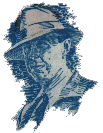 |

The First and Only Weekly Online Fanzine Devoted to the Life and Works of Edgar Rice Burroughs |
 |
 |
    
Chattering from the Shoulder
# 22
Commentary
|
 |
Introduction
The Man-Eater was first published in "The New York Evening World" newspaper, November 15, 16, 17, 18, 19, 20, 1915. It was written in between The Son of Tarzanand Beyond Thirty.
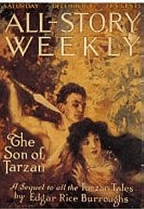
|
Prologue
Ruth is relieved by the Belgian Lieutenant De Boes and goes back to Virginia with her daughter Virginia. The elder Scott takes care of his daughter-in-law and grandchild for 19 years. The "stocks" prove to be but a single sheet of paper. He puts it in a wall cupboard instead of his safe. Chapter 1
Chapter 2
Chapter 3
Chapter 4
Chapter 5
Chapter 6
Chapter 7
Chapter 8
Chapter 9
Chapter 10
Chapter 11
|
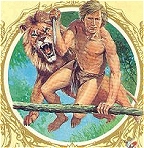
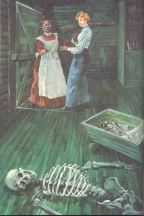
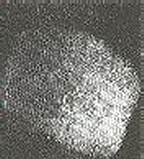
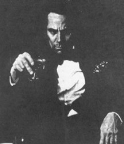
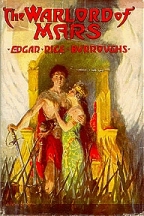
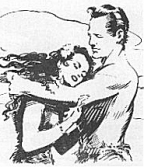
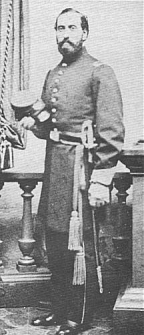
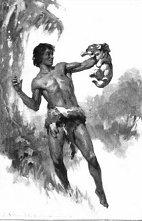
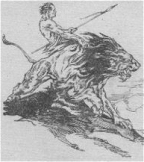
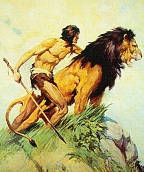
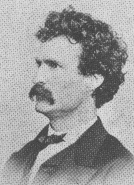
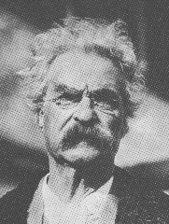
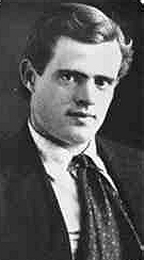
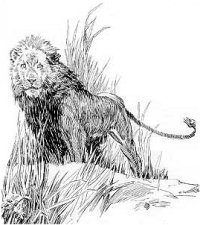 |
Das Kapital Meets The Great Gatsby,
In some ways, The Man Eater might be seen in the category of ERB's girl books. This is a story of social and financial misunderstanding bearing upon the legitimacy of the birth of the heroine, Virginia. It is a little mystery puzzle that hinges on a missing document, a marriage certificate, which is necessary to prove Virginia's right to inherit a rather large fortune. It is another demonstration of the great adventure-romance writer's thoughts about plotting a story around money and social position. Although the readers of ERB might prefer his more exciting leaps into a blood and guts adventure, this rather crabbed and slow-starting tale exhibits ERB's interest in the intricacies of legal matters. For example: it is easy to see the social and financial problems of Jane Porter in Tarzan of the Apes as a subplot to Tarzan's more adventurous story, however, Burroughs hinges this famous novel on a legal matter of baby Tarzan's fingerprints on a diary. The legalities of family fortunes and positions in society were issues close to Burroughs' heart, and these mundane concerns are often crucial to the plots of his stories. The typical Burroughsian hero and heroine held a high social position, even though it was often hidden from the character at the beginning of the story. John Clayton was a member of the House of Lords. John Carter became a Warlord of Mars. David Innes became the Emperor of Pellucidar. In fact, Burroughs often claimed that he wrote for money (and the high social position money could provide ) rather than for art itself. Even though this may make him seem a money-grubbing capitalist rather than a romantic artist, the attitude was part of the society in which he lived. American heroes were successful capitalists, entrepreneurs, or inventors, and Burroughs became one of the best of them. Mark Twain lost his shirt following one ill-chosen enterprise after another. Jack London sunk most of his fortune on an ill-fated ship, the Snark, and his Wolf House that burned down before he could move in to it. Burroughs too extended himself beyond his means in his Tarzana estate and country club, but writers of the time desperately wanted to reach a place in high society. Wealth and its increase or decrease is an issue that can be followed throughout ERB's career in his personal life and in the lives of his characters. Tarzan loses a fortune and has to go back to Opar for more jewels and gold. This is more than a fairy tale theme. It is the fundamental driving force of the American dream. Carry Me Back to Old Virginia John Carter was known as "The Virginian." It is an obvious reference to one of ERB's favorite novels by Owen Wister. In an article written in 1922 for the Los Angeles Times he stated, "I believe The Virginian to be one of the greatest American novels ever written . . . I venture that a hundred years from now it will constitute his sole link to Fame." The state of Virginia was dear to ERB. The Coleman branch of his family, on Mary Evaline's side, had been active in the Continental Army and in various Virginia regiments. Porges reports that Ed was impressed by the military exploits of his ancestors, and he was proud of his father's record as a major in the Union Army during the Civil War. (Porges, 773). Soldiers of famous Virginia Regiments were in his imagination and in his blood. In her "Memoirs of a War Bride" Mary Evaline Burroughs (ERB's grandmother) recounts visiting Richmond and the residence of Jefferson Davis where she "picked-up" a large heavily-fringed "tidy" as a souvenir. I wonder who has this little item today? In any event, ERB was fond of Virginia and creates a great character in Virginia Scott of Virginia in his The Man-Eater. She is a plucky lass who does not faint like her mother does at the sight of a man-eating lion. By 1915, ERB already knew how to create a heroine with depth of character to match his heroic gentlemen. The Lion Story I didn't have a copy of The Man-Eater back in 1995 when I wrote "The Soul of the Lion," my large Jungian study of the meaning of lions in the Tarzan mythos. When I finally read it this week, I was very excited about the kiss between Virginia and Gordon over the head of the golden lion, Ben, King of Beasts. This symbolic lion-related kiss at the end of the story is the precursor of much that is to come in the Tarzan Series, specifically with Jad-bal-ja, the Golden Lion, and it provides another example of a theme that ERB developed over the years to symbolically link many of his heroes, heroines, and beasts. The lion remained an enemy of Tarzan throughout the series with several remarkable exceptions. He had to work hard to arrive at the point Gordon reaches apparently without effort in this little story. The type of man-lion friendship may be seen in Aesop's tale of Androcles and the Lion. A man removes a thorn from the lion's paw and thus gains a life-long friend. Gordon rescues his lion from a pit and out of gratitude it refrains from eating him. Of course, this is not the realistic behavior a a confirmed man-eater, nor is it even a believable story about lion behavior in general. A wild lion would most likely be indifferent to a human act of kindness. It would not even be aware that it had escaped from the pit with any human aid whatsoever. A log appeared, and it got out of the pit -- end of story. Ben in fact acts more like a dog rather than a lion. He is the one who recognizes the debt rather than the man, who stays more or less in the dark as to the lion's motivation for his behavior. Burroughs plays with Ben in the same way that Jack London played with the psychology of the wild wolf-dog, White Fang. In each case the animal is given powers of reasoning beyond the normal behavior of his species. It is the knowing animal that links his fate to that of a specific man. Tarzan had to 'tame" the lion of the gulch in Untamed by mastering it with fear, and he raised Jad-bal-ja from cubhood. Ben is the one who drives the relationship in this story -- a beast who becomes the friend of a man. Tarzan enters a similar relationship with Sheeta in "Beasts" when he rescues him from a fallen tree. There is the same sense of gratitude that drives the unlikely friendship between man and beast. Jad-bal-ja is the great lion-dog of the Tarzan series who is taught to fetch and carry, to lie motionless in hiding upon voice command, to move from point to point as Tarzan indicated, and to "Heel." Despite his wild nature, he always obeyed Tarzan like a perfect hunting dog. Ben follows this same pattern on his own volition, which makes him a remarkable precursor to Jad-bal-ja. While I was writing this article, my eyes traveled a moment across the titles of my library and I was surprised to see the name Ben leap out at me in Ben-Hur, the title of the famous novel by Lew Wallace. I don't know that the same thing happened to ERB when he was searching for a name for his Man-Eater, but it is not impossible. Ben is not exactly the name one might choose for a fierce jungle beast unless it held some other connotation in ERB's mind. ERB and Fate Burroughs perhaps states his views on Fate the best in the Prologue of Tarzan Triumphant. " . . . that master artist, Fate . . . weaves the design that is never finished. . . . . . Fate is patient. She waits a hundred or a thousand years to bring together two strands of thread whose union is essential to the fabrication of her tapestry, to the composition of the design that was without beginning and is without end." What we see as an often overused device of coincidence in ERB's writing might actually have been his personal sense of Fate. Ben is captured and brought to America. His train is wrecked at the very spot he must arrive at to complete his mission of Justice -- revenge upon the killers of his mate. Ben's story is a love story too -- one that was cruelly ended by the murder of his beloved. Justice demanded retribution. I wonder how many of the so-called coincidences in ERB's writing is a matter of Fate acting in the service of Justice? Is it possible that what we see as a literary weakness in his writing is precisely his method of seeing the world as Fate that eventually leads to a Just ending. Perhaps I am extending too far, but many of ERB's stories seem to demonstrate this "vengeance of the Furies." In Greek drama the task of the Erinnyes, or Furies, is to punish crime. No matter where the guilty party goes, he is found, as Orestes discovered in the great trilogy the Oresteia of Aeschylus. There is a great power in this avenging lion who shows up on the doorstep of the civilized world in The Man Eater. In chapter 9 when Ben escapes from the train there is a moment when the beast pauses "as though minded to remain and wreak vengeance on the human race," but he leaves to follow the spoor of the guilty ones. In a scene that almost takes your breath away he enters the house where a flood of moonlight pours through the open doorway falling upon the lion, revealing him in all his majesty of savage strength and alertness. The fury actually claws through the bedroom door to consummate his mission. Taylor's final moments are spotlighted in the glare of the car's headlights like a spotlight in a play. The final scenes are played out in the darkness and the moonlight in another heart-stopping moment when Gordon actually runs toward the lion flooded by the dramatic rays of the watching moon. He sees the jagged scar on the forearm of the lion at the last minute and knows that everything will be well. The End |
|
Fate and the Furies The Three Fates Paradise Lost: eText Xena Episode: The Furies Greek Literature Links Illustrated Greek Theatre |


Text and original art by:
David AdamsNkima Chattering From The Shoulder
Read 'em all at:
ERBzine 0396
![]()
![]()
Volume
0455
![]()

![]()
BILL
HILLMAN
Visit
our thousands of other sites at:
BILL
& SUE-ON HILLMAN ECLECTIC STUDIO
ERB
Text, ERB Images and Tarzan® are ©Edgar Rice Burroughs, Inc.-
All Rights Reserved.
All
Original Work ©1996-2004/2010 by Bill Hillman and/or Contributing
Authors/Owners
No
part of this web site may be reproduced without permission from the respective
owners.